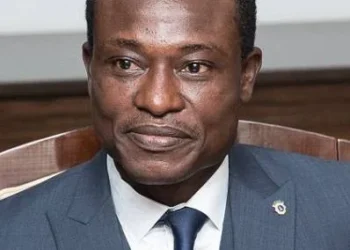The Ghanaian Legislature plays an integral constitutional role in the country’s governance system. More fundamentally, the constitution gives to the Legislature and its members an essential role to act as an important check on the exercise of Executive Power.
As such, Members of Parliament (MPs) are among the group of people whose salaries and allowances payable are to be determined by Parliament on the recommendation of the committee to be constituted by the President as spelled out in Article 71 (1) and (2) of the 1992 constitution of the Republic of Ghana.
Ex gratia is a Latin phrase that translates in English as ‘out of goodwill’. However, the issue of Ex-gratia payments to MPs in Ghana has become very controversial. Whilst it is meant to show appreciation for the services rendered to the nation, many people believe the amount normally given out to the MPs is too outrageous.
To such people, it constitutes a drain on the country’s meager resources which are woefully inadequate to take care of the nation’s numerous and ever-increasing challenges.
A survey conducted by the Institute of Economic Affairs (IEA) on the 1992 constitution review in 2012 found that over 60% of civil servants/public sector workers considered MPs ex-gratia payments to be excessive. This view was more pronounced with those who had a less favorable perception of their MP’s performance.
There have been several calls by a section of Ghanaians for a review of ex-gratia payments.
The current Speaker of Ghana’s 8th Parliament in the 4th Republic, Alban Kingsford Sumana Bagbin is reported to have said whilst speaking on a news program, ‘Point Blank’ that “the whole idea of ex-gratia, I do not think is serving the purpose for which it was established; it is a complete waste”.
Instead of scrapping it altogether, a group called ‘We the people matter movement’ in May 2019 said;
“We are calling for the abolishment of the ex-gratia payment to returning members of parliament. An MP who serves a four (4) year term in parliament and gets to win a second term should not be paid the ex-gratia for his first term served. Ex-gratia payment should be limited ONLY to MPs exiting the house after their first term. Subsequent terms of service as an MP should not attract any ex-gratia payment from the Ghanaian taxpayers”.
Critical Analyses of Ex-Gratia
In 2009, MPs were paid an average of GH¢80,000 each but this was reviewed upwards for MPs who served in the 5th parliament of the 4th Republic.
In 2013, a total of GH¢47 million was paid by the government as ex gratia to the 230 MPs. MPs who retained their membership of the House after December 7, 2012, elections received GH¢276,000 each, while those who lost their seats were paid GH¢311,000 each.
The amount paid to parliamentarians has been on the rise amid the increased number of constituencies. It is still unclear how much was paid as ex-gratia to the 6th parliament, but following the trajectory, we expected the amount to be higher than what was paid to the previous parliament.
More recently, all the 275 MPs who served in parliament between January 2017 and January 2021 are speculated to receive approximately GH¢452,000 each as ex-gratia.
The country would have saved GH¢100,796,000.00 if only the 52 MPs who lost their seats were paid instead of paying out GH¢124,300,000.00 as ex-gratia to all the MPs who served in the 7th Parliament of the 4th Republic. The government would have saved even more if we are to pay MPs only once at the end of their first term in parliament as suggested by the ‘We the people matter movement’.
Ex-gratia and MPs Performance
Aside from the opportunity costs of the Ex-gratia payments to the nation, one striking finding of the survey conducted by the IEA was that respondents were happier with the ex-gratia payments if they were linked with better, or perceived better performance of their MP.
Also, public opinion surveys conducted by Afrobarometer show that between 2002 and 2013, an average of 85.8% of Ghanaians had no contact with their representatives in parliament. How do you know the needs of your constituents when you don’t visit your constituency; the question begs an answer.
It can be inferred from these surveys that the public outcry on the payment of ex-gratia could partly be as a result of constituents’ perception of their MPs as not being responsive to their needs, so they see it as payment for no work done.
What should be done
Moving forward, rather than paying all parliamentarians ex-gratia, the state should consider paying only exiting parliamentarians. MPs retaining their seats should be given tokens to show appreciation for their service in addition to their salaries. The rest of the money could be channeled to other pressing issues that are laying unattended, due to lack of money.
Secondly, the government may come up with an ex-gratia package that should be maintained and reviewed after a fixed number of years so that the burden on government resources can be reduced. Currently, the debt-to-GDP ratio stands at 71% at End-September 2020, the unemployment rate at 8.4%, as well as huge housing deficits, compounded by limited fiscal space amid COVID-19.
It has, therefore, become critical for the government to cut down expenditure, especially on allowances. The country more than ever needs lots of funds to resuscitate the economy that has been rendered almost ‘lifeless’ by the current COVID-19 pandemic.
Finally, as MPs require huge ex-gratia, so are their constituents requiring them to perform their duties very well to the satisfaction of the ordinary Ghanaian and not just serving party or individual interests.
There is the need for MPs to relate more harmoniously with their constituents, thus, interacting more with their people on national issues and their needs as consensus building is a necessary tool to bringing about development in any multi-party democratic state.























